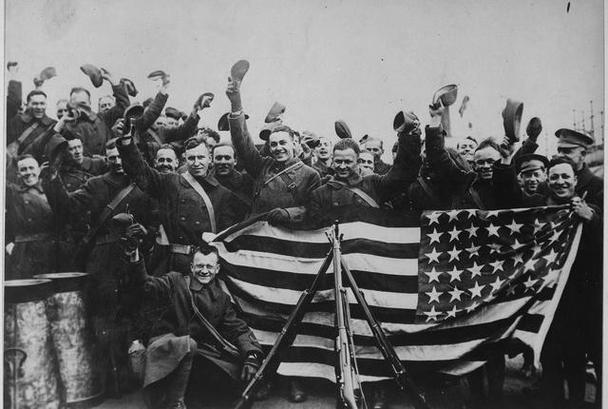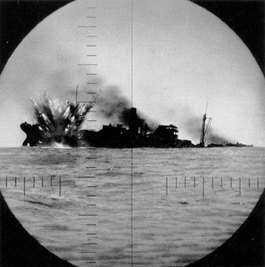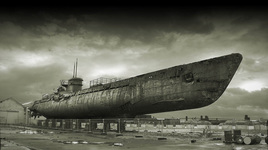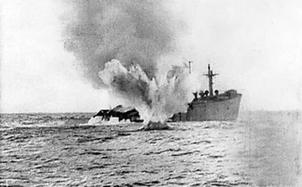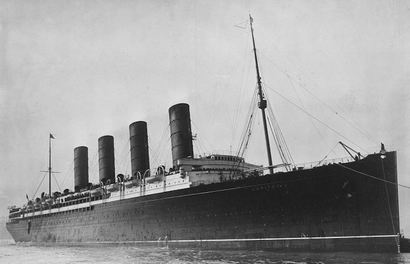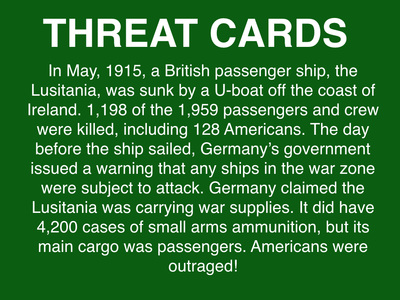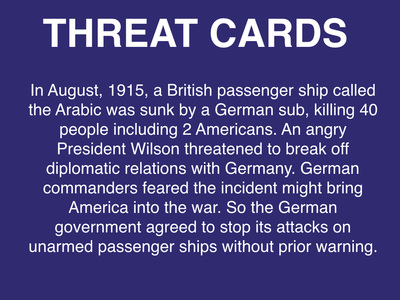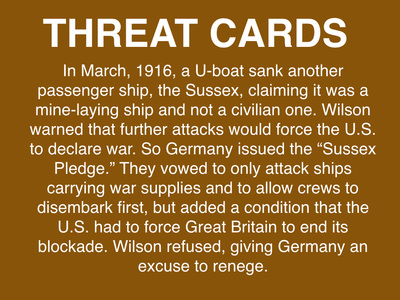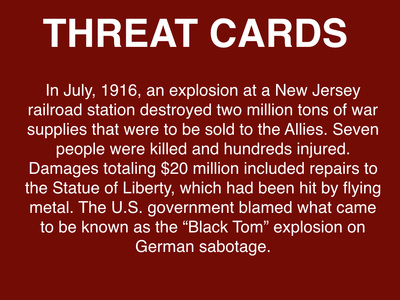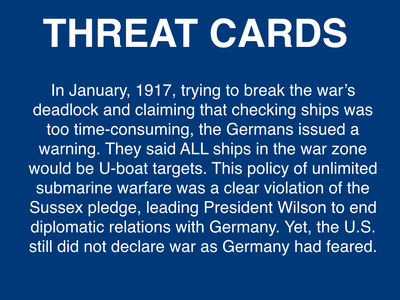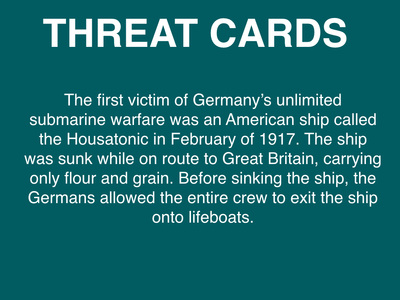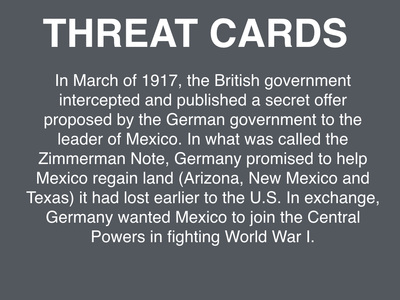PUSHING US TOO FAR
READ ABOUT IT!
Welcome to the Pushing US Too Far Virtual Center. The first thing your group needs to do is read about the reasons America entered World War I. After you read, you need to work together to complete the Pushing US Too Far Center Page in your Lesson Chronicles.
PUSHING US TOO FAR
The Lusitania
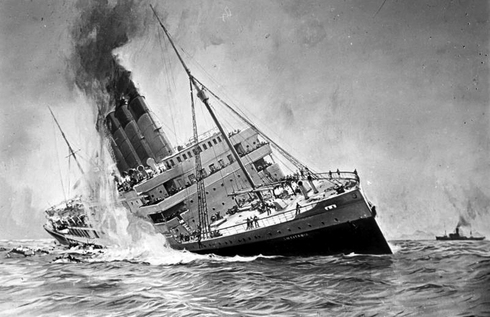
Another event that brought America closer to war was the sinking of the Lusitania. The Lusitania was a British ship that carried both cargo and passengers. It made the trip back and forth across the Atlantic Ocean, carrying travelers between Great Britain and the United States. Fast and luxurious, the Lusitania was a popular ship; it had been described as a floating palace.
In May 1915, the Lusitania was crossing the Atlantic Ocean. In addition to about 2,000 passengers, it was also carrying a cargo of ammunition for the Allies. On May 7, German submarines torpedoed the Lusitania. In twenty minutes, the Lusitania was gone, sunk to the bottom of the ocean. About 1,200 passengers went down with the ship, including many Americans. After that, U.S. citizens began to think of Germany as a "bully" and to side with the Allies.
In May 1915, the Lusitania was crossing the Atlantic Ocean. In addition to about 2,000 passengers, it was also carrying a cargo of ammunition for the Allies. On May 7, German submarines torpedoed the Lusitania. In twenty minutes, the Lusitania was gone, sunk to the bottom of the ocean. About 1,200 passengers went down with the ship, including many Americans. After that, U.S. citizens began to think of Germany as a "bully" and to side with the Allies.
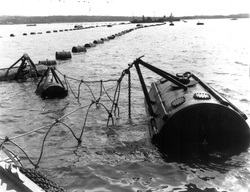
Germany had made promises not to sink ships without first giving a warning so that passengers could leave the ship. However, this was wartime, and Germany did not always keep its promises. Then, Germany began to blockade Great Britain, attacking more and more ships.
These attacks caused problems for the U.S. economy. It made it difficult for U.S. businesses to make money. Businesses needed to be able to travel freely on the seas to deal with foreign countries, especially Great Britain.
These attacks caused problems for the U.S. economy. It made it difficult for U.S. businesses to make money. Businesses needed to be able to travel freely on the seas to deal with foreign countries, especially Great Britain.
Propaganda
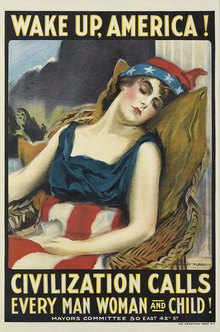
Government officials in the United States began to think that maybe the U.S. would have to enter the war to protect its own interests. They began to try to change people's minds about the war. The government began a propaganda campaign which included parades in support of the Allies and leaflets that pictured the Germans as fierce barbarians. They also began to build up the number of troops in the Army, the Navy, and the Reserves. They began building more Navy ships. A National Security Committee was formed.
While all of this was going on, many Americans still hoped to stay out of the war. President Wilson still hoped for the United States to remain neutral. He did not want the U.S. to be pulled into the war. In a speech, he said, "There is such a thing as a man being too proud to fight."
While all of this was going on, many Americans still hoped to stay out of the war. President Wilson still hoped for the United States to remain neutral. He did not want the U.S. to be pulled into the war. In a speech, he said, "There is such a thing as a man being too proud to fight."
The Zimmerman Telegram
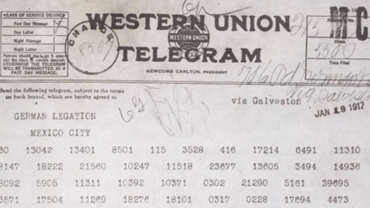
Then, on January 16, 1917, another event occurred that brought us even closer to war. Great Britain showed the United States a telegram that it had intercepted and decoded. The telegram was from the German Foreign Minister, Arthur Zimmerman, to the German Ambassador in the United States. The telegram said that he should invite Mexico to join an alliance with Germany. The telegram said that if Mexico joined the alliance, Germany would help it win back Texas, New Mexico, and Arizona from the United States. The war had come closer to home. The Zimmerman Telegram angered Americans and increased the desire for the United States to go to war.
A Time For War
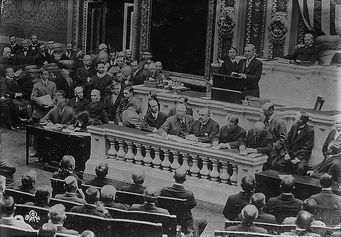
Unrestricted Submarine warfare, the sinking of the Lusitania, and the Zimmerman telegram were just three of the things that had Americans demanding that the United States go to war. Our economy and our independence on the seas and on our homeland were threatened. Finally, President Wilson felt that he had no other choice. He decided that the U.S. should enter the war. Many reasons had led up to his decision, but he wanted to give the American people one good reason to support the war. So he only said, "The world must be made safe for democracy," when he declared war on April 6, 1917.
ANALYZE IT!
In today's Analyze It Activity, you will work in pairs and use the Threat Cards embedded below to complete the embedded assignment page. Read and order their cards based on the “threat levels” posed by each. Use the assignment form to help guide your thoughts and to submit your answers.
- First, read each card.
- Decide if each situation threatens American security, American interests, America's economy, or American democracy. Does it threaten more than one?
- For each type of threat you identify, cite evidence from the card to support your opinion.
- Put the cards in order from the greatest threat to the least threatening.
- Answer the questions after you finish organizing the card order.
- Be ready to discuss your answers in class.
Analyzing the Threats
Ranking the Threats
|
|
|
PROVE IT!
You just learned about the reasons the United States entered World War I. Now you need to show off what you know. Complete the Center Check by clicking on the Center Check Icon below and answering the questions.
CENTER COMPLETE!
You have completed the Pushing US Too Far Virtual Center. Click on the button below to go back to the Lesson 3 - America Enters World War I.

